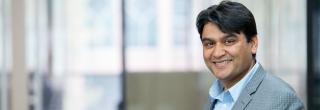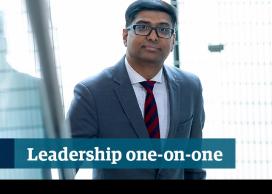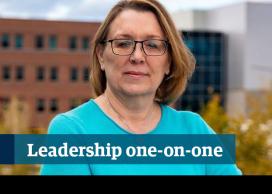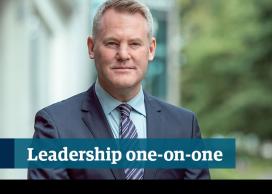Dr. Rehan Sadiq joined UBC Okanagan in 2009 and is Associate Dean of the School of Engineering.
Prior to arriving at UBC, Dr. Sadiq worked in the Urban Infrastructure Program of National Research Council Canada, and since 2002 has been involved in research related to drinking water quality modelling, environmental risk analysis and decision-making, and lifecycle asset management of civil infrastructure systems. He was named UBC Okanagan’s Researcher of the Year in 2014, and is an author of more than 400 publications in peer-reviewed journals, book chapters, books, and conferences. He is listed among the top 200 most cited civil engineering researchers.
Q1. What quality do you most admire in a leader?
RS: I think the most important thing is integrity. Being a leader is not about making everyone happy all the time — instead, you will need to make tough decisions sometimes. Ultimately, it’s about your sincerity and clarity towards your goals.
Q2. What makes you laugh?
RS: My daughter and son, aged 13 and 11, make me laugh. I really enjoy their innocence, energy, and playfulness. For example, my son will occasionally invent new and funny nicknames for me that always make me laugh.
Q3. Who inspires you, and why?
RS: I really like reading biographies about scientists — these are my role models. Recently, I was reading about Thomas Edison, who demonstrated dedication and commitment to his vision despite having to face others who didn’t believe in him. I think that’s what really matters. Intelligence can only take you so far. Most of the time, it’s your hard work and dedication that gets you to your goal.
Q4. For you, what makes UBC different?
RS: UBC has an outward look rather than an inward look, and we reach out to the community both locally and globally. We recognize that it’s much more than operating a financially viable university. There is something bigger at stake, and we’re reaching out and addressing the problems that really matter to society.
Q5. How do you like to recharge?
RS: I really like going for hikes with my family and friends. This is the great thing about Kelowna and the region — it’s so beautiful, and there are so many places to go to and be out in nature. I often feel like I am on vacation here.
Q6. What’s the most important lesson you’ve learned?
RS: I think the importance of kindness, and making it a part of your practice and your personality. I think this can change lives. You meet certain people in your life who show you kindness, and you can see how you change because of that. It makes it easier for you to pay this kindness forward to others, and to see how your relationships form a part of who you are.
Q7. If you weren’t in the field you are now, what role might have interested you?
RS: I always wanted to be a professor and work with young people. My dad really wanted me to be a doctor when I was growing up; however, I really like interacting with young minds, and it’s one of the reasons I ended up wanting to be an academic. Research on its own was not enough for me, and the university provides me with an opportunity to work with students. I get to learn a lot from them, and their energy and drive is contagious.
Q8. Who are your favourite writers?
RS: I used to read a lot of Saadat Hasan Manto, a famous Urdu writer. He was very progressive and had a very tough life, as many writers do. He came from a society that was comparatively conservative at the time. Yet he was a humanist, and he stuck to his values. More recently, I’ve really enjoyed reading leadership books, including those written by Robin Sharma and Malcolm Gladwell. I find them really inspiring.
Q9. What would you like to be remembered for?
RS: Generosity, kindness and fairness. I don’t want to be remembered as a great scientist — for me, that’s too small. I think that people remember and respect who you are as a person.
Q10. What do you value in your colleagues?
RS: Trust and sincerity. I think that’s the bottom line, and I enjoy that my colleagues and I all take each other at face value. I have the opportunity to work with a lot of great colleagues in the School of Engineering and across the university. I’ve also learned that it’s important not to try to change people. Instead we need to focus on changing our own perspective of other people.
Q11. If you could have a super power, what would it be?
RS: I think poverty is a killer, and so I would like to be able to eradicate poverty. You can’t make an ethical argument with someone who is hungry, or when their basic needs aren’t met. I think that this is the key to building a world that has peace.
Q12. What advice would you give a young student just starting out?
RS: Believe in yourself. This seems like a simple statement, and we hear it a lot. But most people don’t know how good they are, and my biggest message would be to believe and trust in yourself. This will make you happy in life, and I believe that finding happiness and peace is the sole purpose of life. We have a tendency to look for role models, and this is OK, but we also can’t compare ourselves to others. This can be the biggest killer of happiness.
Q13. What is your vision for the School of Engineering?
RS: I really want students to continue to come to the School of Engineering as an intentional choice, because we are one of the best. Our growth has been amazing, and in the next academic year we will celebrate our twelfth anniversary. I want to see the School of Engineering continue to grow and for us to be thought of as a ‘place of choice’.
Published:
Interviewed by: Chris Sulymka, UBC Internal Communications



